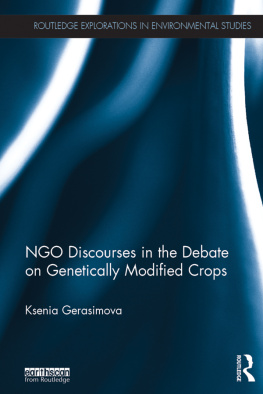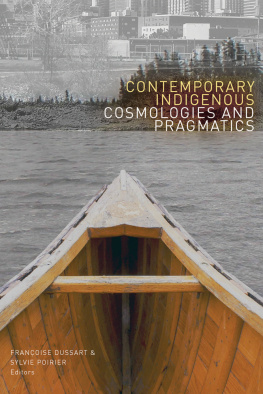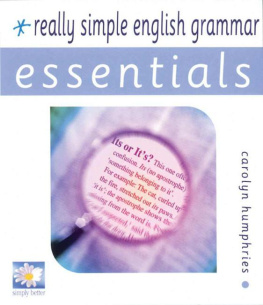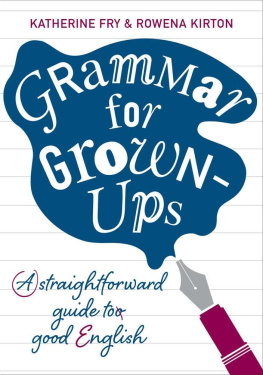Ksenia Shagal - Participles
Here you can read online Ksenia Shagal - Participles full text of the book (entire story) in english for free. Download pdf and epub, get meaning, cover and reviews about this ebook. year: 2019, publisher: De Gruyter Mouton, genre: Home and family. Description of the work, (preface) as well as reviews are available. Best literature library LitArk.com created for fans of good reading and offers a wide selection of genres:
Romance novel
Science fiction
Adventure
Detective
Science
History
Home and family
Prose
Art
Politics
Computer
Non-fiction
Religion
Business
Children
Humor
Choose a favorite category and find really read worthwhile books. Enjoy immersion in the world of imagination, feel the emotions of the characters or learn something new for yourself, make an fascinating discovery.

- Book:Participles
- Author:
- Publisher:De Gruyter Mouton
- Genre:
- Year:2019
- Rating:4 / 5
- Favourites:Add to favourites
- Your mark:
- 80
- 1
- 2
- 3
- 4
- 5
Participles: summary, description and annotation
We offer to read an annotation, description, summary or preface (depends on what the author of the book "Participles" wrote himself). If you haven't found the necessary information about the book — write in the comments, we will try to find it.
Participles — read online for free the complete book (whole text) full work
Below is the text of the book, divided by pages. System saving the place of the last page read, allows you to conveniently read the book "Participles" online for free, without having to search again every time where you left off. Put a bookmark, and you can go to the page where you finished reading at any time.
Font size:
Interval:
Bookmark:
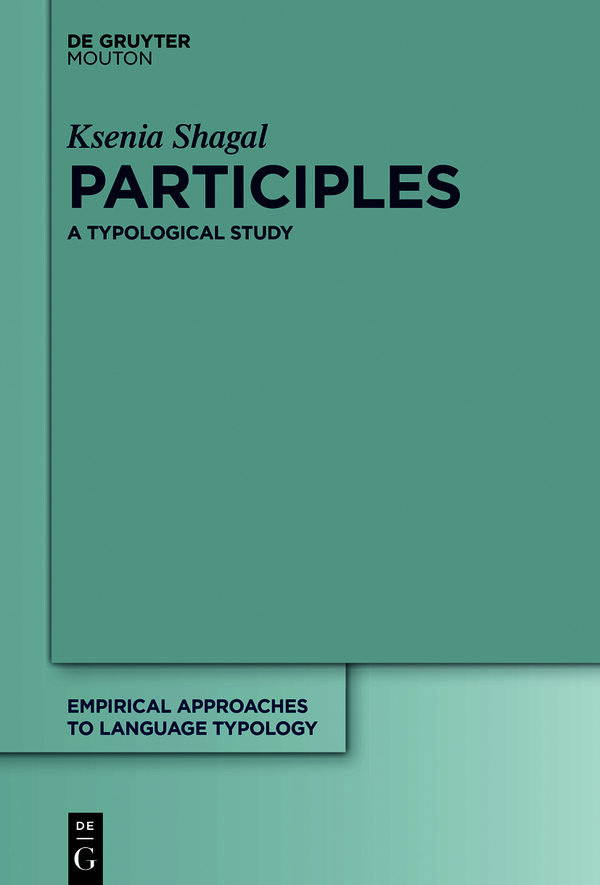
Empirical Approaches to Language Typology [EALT]
Edited by
Volume
ISBN 9783110627527
e-ISBN (PDF) 9783110633382
e-ISBN (EPUB) 9783110629934
Bibliographic information published by the Deutsche Nationalbibliothek
The Deutsche Nationalbibliothek lists this publication in the Deutsche Nationalbibliografie; detailed bibliographic data are available on the Internet at http://dnb.dnb.de.
2019 Walter de Gruyter GmbH, Berlin/Boston
Ksenia Shagal
Participles
Empirical Approaches to Language Typology
Editors
Georg Bossong
Bernard Comrie
Kristine Hildebrandt
Jean-Christophe Verstraete
Volume 61
Ksenia Shagal
Participles
A Typological Study
De Gruyter Mouton
ISBN 978-3-11-062752-7
e-ISBN (PDF) 978-3-11-063338-2
e-ISBN (EPUB) 978-3-11-062993-4
Library of Congress Control Number: 2019949211
Bibliographic information published by the Deutsche Nationalbibliothek
The Deutsche Nationalbibliothek lists this publication in the Deutsche Nationalbibliografie;
detailed bibliographic data are available on the Internet at http://dnb.dnb.de.
2019 Walter de Gruyter GmbH, Berlin/Boston
www.degruyter.com
This book is a revised version of my doctoral dissertation Towards a typology of participles, which I defended at the University of Helsinki in April 2017 and published as . Many people have helped me in one way or another during my work on this book, and I would like to express my sincere gratitude to all of them.
I am extremely grateful to Seppo Kittil, the supervisor of the original dissertation, for all the feedback he provided over the years, and for his amazing ability to cheer me up no matter what. Many thanks to Maria Koptjevskaja-Tamm and Sonia Cristofaro, the preliminary examiners of the dissertation, for their encouraging reviews and suggestions for improvement, which I tried to implement in the revised version of the book. I am also indebted to Peter Arkadiev for his careful reading and valuable comments on the manuscript.
I would like to thank Jean-Christophe Verstraete, the responsible editor of the series Empirical Approaches to Language Typology, for all the work he did throughout the revision stage, and for his incredible patience. I am also thankful to Katja Schubert, the production editor of the book, for her technical help, and to all the others at De Gruyter Mouton involved in the publication process. Special thanks to Eduard Shagal for preparing the maps and figures for this book, and for all the other help.
Most of the time I spent working on this book, I was lucky to be a member of the Department of (Modern) Languages at the University of Helsinki, and I benefited greatly from its research environment. I wish to thank all my colleagues in General Linguistics and Finno-Ugrian Language Studies, in particular those behind the Helsinki Area & Language Studies initiative, for building up a lively research community that has so many inspiring activities to offer. Financial support for my research was provided mainly by the University of Helsinki and the Langnet Doctoral Programme.
I am deeply indebted to all those who assisted me in different ways in obtaining information on individual languages. Many thanks to the numerous language experts who shared their knowledge and data, and to the speakers of Kalmyk, Nanai, Nivkh, Uilta, Erzya and Hill Mari who worked with me on different occasions. I also wish to express my gratitude and admiration to all authors of descriptive grammars, without whom typological studies like this one would hardly be possible.
Finally, I would like to thank all those wonderful people in and outside of academia who have supported me throughout these years. This book would have never been completed without them.
(For information on the standardization of the glosses see
||long pause (Nias)
(*)ungrammatical if a specific segment is added
*()ungrammatical without a specific segment
___gap in a relative clause (where the relativized participant would be if expressed overtly)
1first person
2second person
3third person
I Vgender classes
Aagent-like argument of canonical transitive verb
ABLablative
ABSabsolutive
ACCaccusative
ACTactive
ACTUALactual
ADat, location typically associated with a particular entity (Tanti Dargwa)
ADFAD -form, i.e. form referring to a property (Panare)
ADJRadjectivizer
ADVadverbializer
AFFaffirmative
AFRaforementioned
AGRagreement
ALLallative
ALNalienable
ANanimate
ANTanterior
AORaorist
APPaffected peripheral participant
ARTarticle
ASPaspect
ASSINVassertors involvement
ASSOCassociative
ATTRattributive
AUGaugmentative
AUGMaugment
AUXauxiliary
CARcaritive
CAUScausative
CHARcharacteristic
CLclassifier
CL 1 , CL 2, etc.noun classes
CMcompact
CNGconnegative
CNTlocation with contact
COMcomitative
COMPLcompletive, completion
CONCconcord suffix
CONJconjunctive
CONNconnector
CONSconsequential case
CONSTRconstruct state
CONTcontinuous
COORDcoordinator
COPcopula
CVBconverb
Dgender class /d/ (Ingush)
DATdative
DEBdebitive
DECdeclarative
DEFdefinite
DEMdemonstrative
DEPdependent marker
DETdeterminer
DETRdetransitivizer
DIRdirectional
DISCdiscontinuity marker
DISTdistal demonstrative
DOdirect object
DOMdifferential object marking
DSdifferent-subject marker
DUdual
DURdurative
DXdeictic prefix to verb
DYNdynamic
ELAelative
EMPemphatic
ENDending
EPepenthetic
ERGergative
ESSessive
EVDevidential
EVTeventual mood
EXexclusive person
EXISTexistential particle
EXPexperiential
EXTextension
Ffeminine gender
FINfinite
FOCfocus
FUTfuture
GENgenitive
GEN 1first genitive (Hinuq, Komi-Zyrian)
GEN 2second genitive (Beserman Udmurt, Komi-Zyrian)
GNMCCgeneral noun-modifying clause construction
GNOgnomic time reference (Panare)
HAsuffix -ha- (Muna)
HABhabitual
HAVEhave, verb-forming prefix (Nias)
HEREhere, deictic element (Pitta Pitta)
HOLLOWa hollow object (Tariana)
HPLhuman plural
HTRhalf-transitive (West Greenlandic)
ILLillative
IMMimmediate
IMPimperative
INinside
INALinalienable
INANinanimate
INCinclusive
INCHinchoative
INDindicative
INESSinessive
INFinfinitive
INFRinferential
INSinstrumental
INTintensifier
INTRintransitive
INTRJinterjection
IOindirect object
IPFVimperfective
IRRirrealis mood
ITERiterative
ITGintangible
Jgender class /j/ (Ingush)
Llow tone
LATlative
LIGligature
LKlinker
LOClocative
Mmasculine gender
MIDmiddle voice
MLOCmodal locative
MODmodal
MSmale speech
MUTmutated nominal
Nneuter gender
NARRnarrative
NECnecessitative
NEGnegation, negative
NEUTneutral tense-aspect suffix
Font size:
Interval:
Bookmark:
Similar books «Participles»
Look at similar books to Participles. We have selected literature similar in name and meaning in the hope of providing readers with more options to find new, interesting, not yet read works.
Discussion, reviews of the book Participles and just readers' own opinions. Leave your comments, write what you think about the work, its meaning or the main characters. Specify what exactly you liked and what you didn't like, and why you think so.


